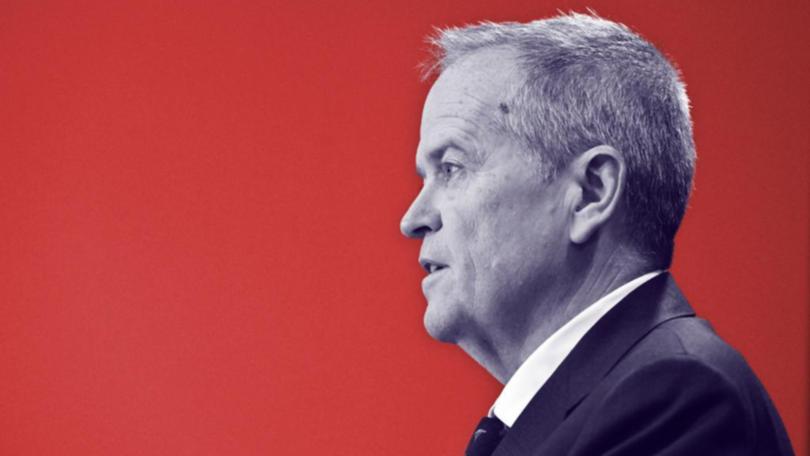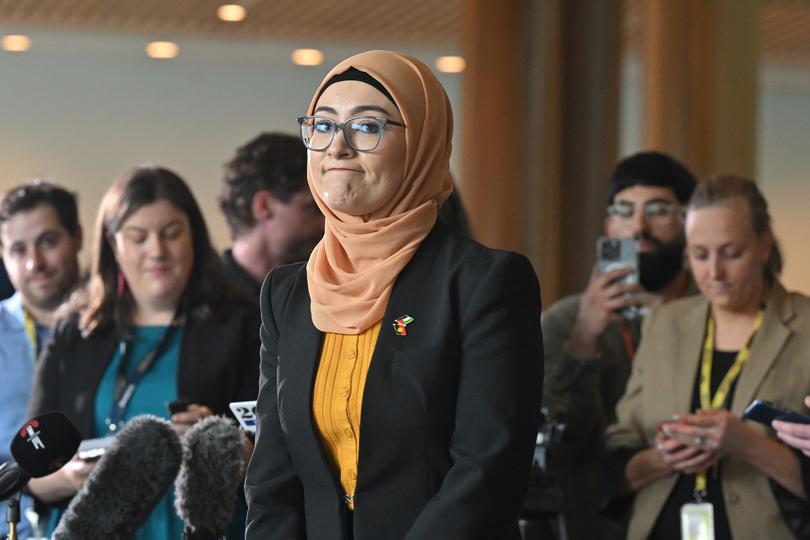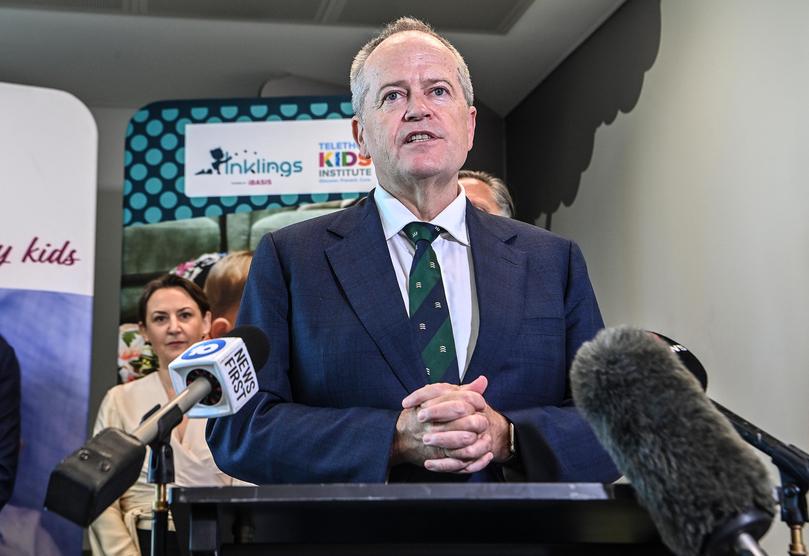Bill Shorten’s departing message for the Left and Fatima Payman and his prospects of a return to politics
Former Labor Leader Bill Shorten says some in the Left hate Israel and described the division exposed on Australian streets over the war in the Middle East as a ‘disaster’.

Former Labor Leader Bill Shorten says some in the Left hate Israel and described the division exposed on Australian streets over the war in the Middle East as a “disaster.”
Mr Shorten, one of the Cabinet’s strongest supporters of Israel, said there were “strong, strident views out there” that were “very confronting.”
“There are some people on the Left who just hate Israel,” he said, in a wide-ranging interview with The Nightly.
Sign up to The Nightly's newsletters.
Get the first look at the digital newspaper, curated daily stories and breaking headlines delivered to your inbox.
By continuing you agree to our Terms and Privacy Policy.Asked what his message for left-wing supporters was when it came to the conflict, he said that while views on his side of politics were not homogeneous, the Left needed to respect the rule of international law.
“It means that terrorist organisations don’t have a right to attack other countries, full-stop,” he said.
“The Left has to understand that the rule of international law is a fundamental underpinning of the global rights system.
“And just because some on the left mightn’t like the political administration of one country, it doesn’t mean you can give a leave pass to global rights and international order.
“Because where does it stop?

“And unilateralism doesn’t work — the idea that one side disarms and no one else does, the other side don’t, doesn’t work.”
He said that Iranian foreign policy was the problem as it was “setting a match to it all” but said he would not contradict Cabinet policy which backs international calls for Israel to agree to a ceasefire in its conflicts with Hamas in Gaza and Hezbollah in Lebanon.
The ongoing debate on the conflict has fuelled protests across the globe, and Australian police have made multiple arrests after demonstrators attending anti-Israel marches held up banners and signs expressing support and sympathy for the Lebanese-based and Iranian-backed terrorist organisation Hezbollah.
Israel’s Prime Minister Benjamin Netanyahu is ignoring international pleas for a ceasefire and continues to target Hezbollah in Lebanon after killing the bulk of the militant organisation’s leadership.
Fatima Payman a ‘deserter’
The war in Gaza has torn at Labor and last week West Australian Senator Fatima Payman launched her own political movement after quitting the party over the government’s stance on Israel.
Senator Payman was suspended from the Labor caucus earlier this year for crossing the floor to support a Greens motion calling for the recognition of Palestine. She has accused Israel of genocide and parted ways with Labor in July, despite winning a prized Senate spot on the Western Australian ticket just two years ago.
However, the former President of Young Labor said her new Australia’s Voice would not focus specifically on harnessing Muslim votes as had been speculated. She will continue to sit in the Senate where she will be able to use her Labor-gained platform to rally support for her independent movement.

Mr Shorten said he was certain the Australian public would work out her motives.
“I’m not interested in making her a martyr or saying she’s been bullied,” he said.
“I know that if I was elected under a flag of one organisation and I deserted that flag I would step down and try again but that’s on her.
“She’s not the first person to put themselves ahead of the people who got them there but that it is up to her.
“I think the people will see, over time, consistency and opportunism.”
Asked if he believed Senator Payman’s movement posed a threat to Labor, which is under pressure from its base as well as Greens supporters over the war in Gaza, Mr Shorten said: “I don’t know.”
But when pressed if he was worried, he said:” No, not really, no I’m not.”
No political comeback
Mr Shorten will retire as Minister for the National Disability Insurance Scheme in February, ending his time in politics in which he was widely speculated to reach the zenith of being prime minister.
His dream was dashed when in 2019 he pitched a large policy agenda, including ending negative gearing, boosting electric vehicles and a plan to scrap tax refunds for retired shareholders, exposing himself to a successful Coalition campaign.
He quit the leadership and was replaced by Anthony Albanese who narrowly won government after the defeat of the unpopular Prime Minister Scott Morrison in 2022.
Labor has pressed ahead with encouraging the take-up of EVs and there is an open debate about revisiting negative gearing.
“I’m pleased that many of the issues which we campaigned on previously, eventually their time seems to have arrived,” he said.
“I might have been a bit early on EVs and charging stations but the weekend’s now here and we now have more EVs.”
Asked what his advice was to anyone wanting to be PM, he said: “Get 50 per cent plus one of the votes, win the election - get enough votes.”

When pressed on what he wished an older Bill Shorten had told a younger version of himself, he said: “Back yourself.”
He said he had not always been true to himself and backed his own judgement out of trying to keep everyone else happy but would not elaborate on examples.
He confirmed he was leaving politics for good.
“I don’t foresee any circumstances where I go back into politics,” he said.
“When you leave, the general rule is you leave.”
He denied that predictions the government, led by Mr Shorten’s successor as leader Anthony Albanese, could slide into minority government were the catalyst for his decision to retire from Parliament.
“No, the polls were irrelevant to my considerations,” he said.
Monday’s latest Newspoll, published by The Australian, showed the Coalition leading Labor on a two-party preferred basis for the first time since the 2022 election.
Mr Shorten said he took Opposition Leader Peter Dutton seriously, although he questioned whether the Coalition had done enough to get over the line, particularly when it came to its nuclear policy.
“No one’s unelectable, oppositions can win,” he said.
“I’m truly sceptical if the Coalition’s done policy homework though.
“They dreamed up this nuclear fantasy for 2050 and it’s a sop to say we’re doing something.
“Oppositions need to work hard and in a range of their areas you’d be hard put to know the opposition’s spokesperson much less their policy.”
Mr Shorten shot to global prominence as leader of the Australian Workers Union in the mid-2000s and became the face of the Tasmanian Beaconsfield mine disaster.
He will become vice-chancellor of the University of Canberra next year and said he had a choice between becoming a “lifer” in politics or leading in a third career.
“I didn’t want to go down the corporate route, although there’s nothing wrong with that,” he said.
“I like serving the public, universities would allow me to keep in touch with people, I don’t want to sit behind a desk.
“It’s a quite practical, vocational bent which does suit me.”
However, he said that reports he would be earning more than $1 million were “sadly wrong.”
“I’m finalising my contract with the university, listen it will be a good wage, I’m not going to complain, but it will not be a million dollars — no.
“I’ll borrow from Mark Twain, reports of my million-dollar wage are sadly, premature — incorrect.”

